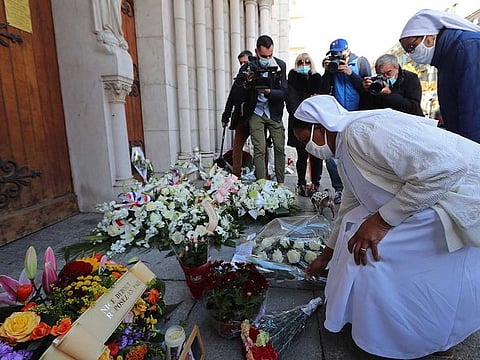Terror attacks in France demand statesmanship
More than ever, what world leaders say at this critical juncture matters

World leaders behave in a settled pattern after a terrorist attack, so we know what to expect after the gruesome events in Nice.
French President Emmanuel Macron will proclaim outrage at the killing of three citizens, and pledge to honour them by upholding the values of the republic “- especially the freedom of expression. Messages of sorrow and solidarity will come from other heads of state. Leaders of Muslim countries will express regret at the blood spilt, apparently in the name of their faith.
Mere rhetoric to the ears of some, but what leaders say at moments like these matters. And all the more so now because too many leaders have recently been unable or unwilling to say the right things.
Consider the aftermath of the Oct. 15 beheading of Samuel Paty near Paris. The murderer, a Chechen refugee, was apparently motivated by the schoolteacher’s decision to show his students some cartoons of the Prophet Mohammed (Peace Be Upon Him) in a class about free speech. (The French satirical magazine Charlie Hebdo had recently reprinted cartoons that had made it the target of a terrorist attack in 2015.)
Macron had himself angered Muslims at home and abroad earlier in the month by declaring Islam a religion “in crisis,” and calling for a thoroughgoing reorganisation of the faith in France. Analysts could hardly miss the political subtext: The president, vulnerable to attacks from the French right, was using Muslims and their faith as scapegoats.
Macron responded to Paty’s murder by focusing on the murderer’s motivation and promising not to sacrifice free expression out of fear. His goal was to reassure the French that there would be no dilution of Frenchness.
But instead of also examining why the French way of life struggles to integrate so many migrants, Macron authorised his hardline interior minister, Gerald Darmanin, to launch a crackdown. “We know what we have to do,” Macron said. “Our fellow citizens are looking for action. The action is there and we’ll intensify it.”
Ostensibly aimed at extremists, the crackdown was used by the minister to expound on his own vision of Frenchness, which is apparently threatened by halal butchers, shops selling ethnic clothing and even specialist aisles in grocery stores. “It always shocked me to enter a supermarket and see a shelf devoted to the food of one community, and to another one next to it,” Darmanin told French television. “Some people need to understand that winning market share by appealing to basic instincts doesn’t necessarily contribute to the common good.”
Predictably, Paty’s murder prompted a fresh airing of old caricatures in symbolic defiance.
Such gestures were bound to inflame opinion in parts of the Muslim world. Still, they might have done no more than stir denunciations by radical Islamists. While most leaders of Muslim nations expressed of dismay, Erdogan called for a boycott of French goods, and suggested Macron needed to have his head examined. His spokesman accused the French president of adopting a hostile stance toward Islam.
After the Nice attack, all there is a chance to rise above ourselves. The French president will again want to reaffirm his commitment to free expression, but he should also speak to the anger and anxieties of France’s Muslim citizens. He must reassure them that they will not be targeted as a community for the actions of a few extremists. He should call on law enforcement and security agencies to refrain from profiling Muslims, and indeed to protect them from attack by far-right extremists. He ought also to bring his interior minister to heel.
More than ever, what leaders say now matters.
Bobby Ghosh is a columnist. He writes on foreign affairs, with a special focus on the Middle East and Africa.






